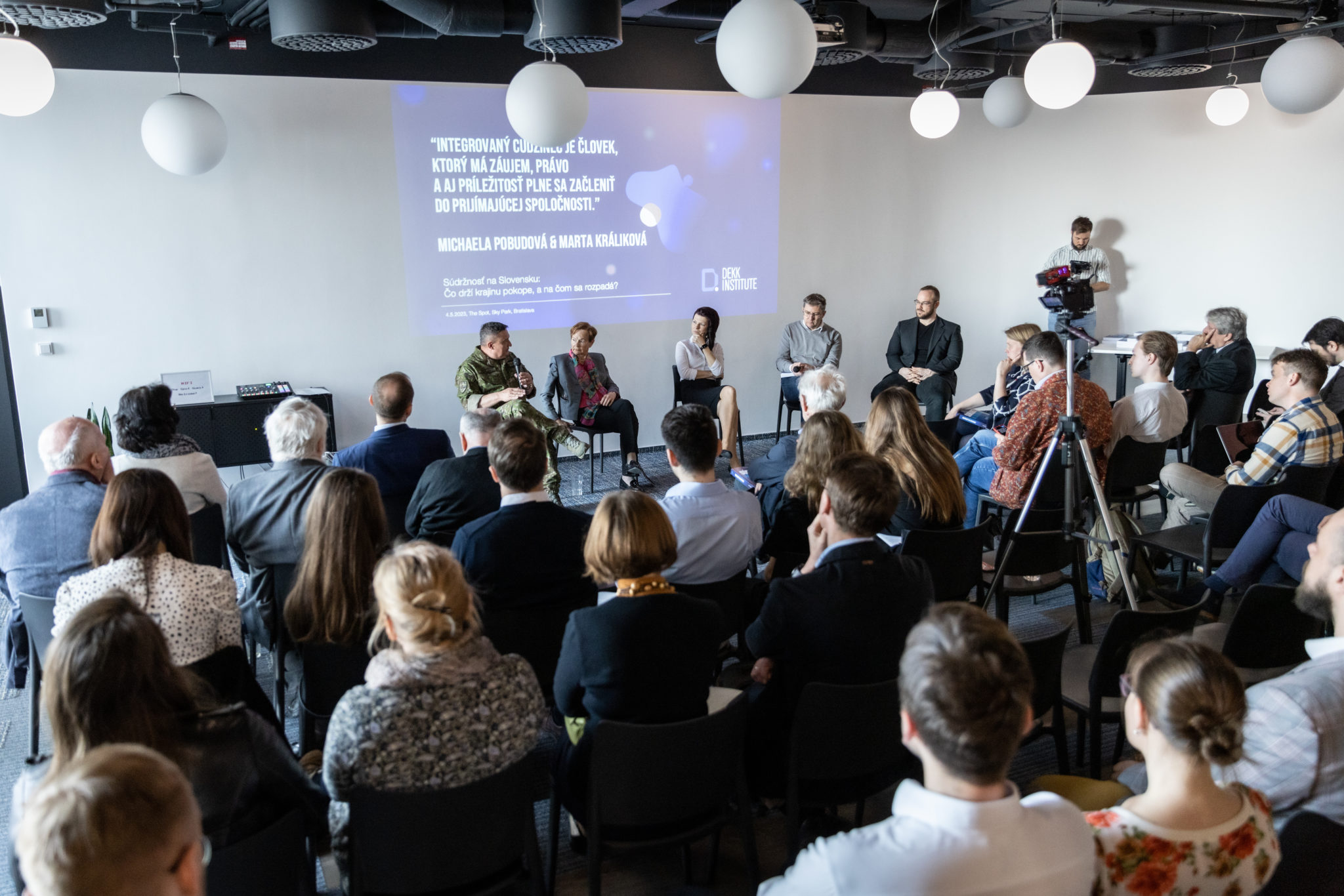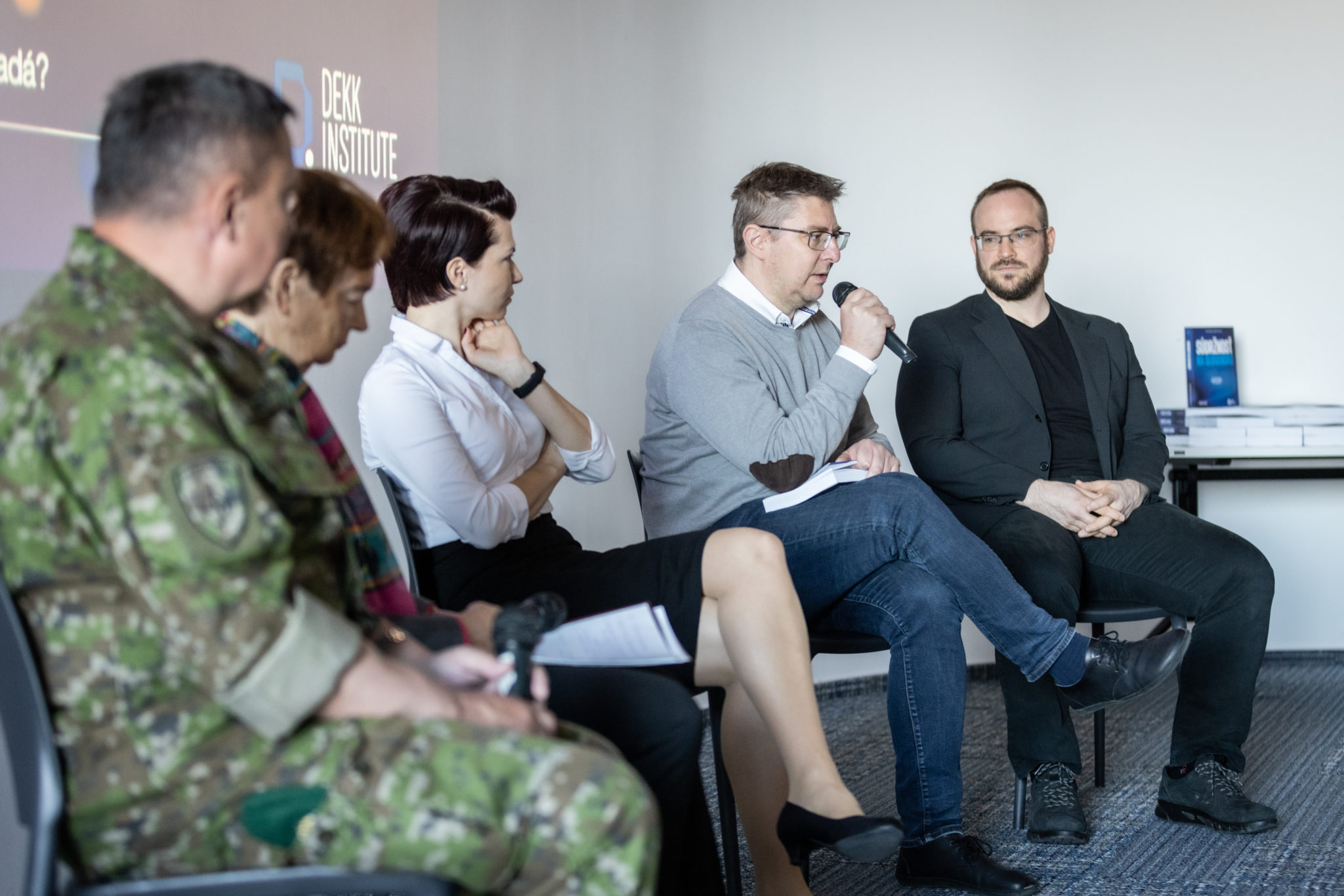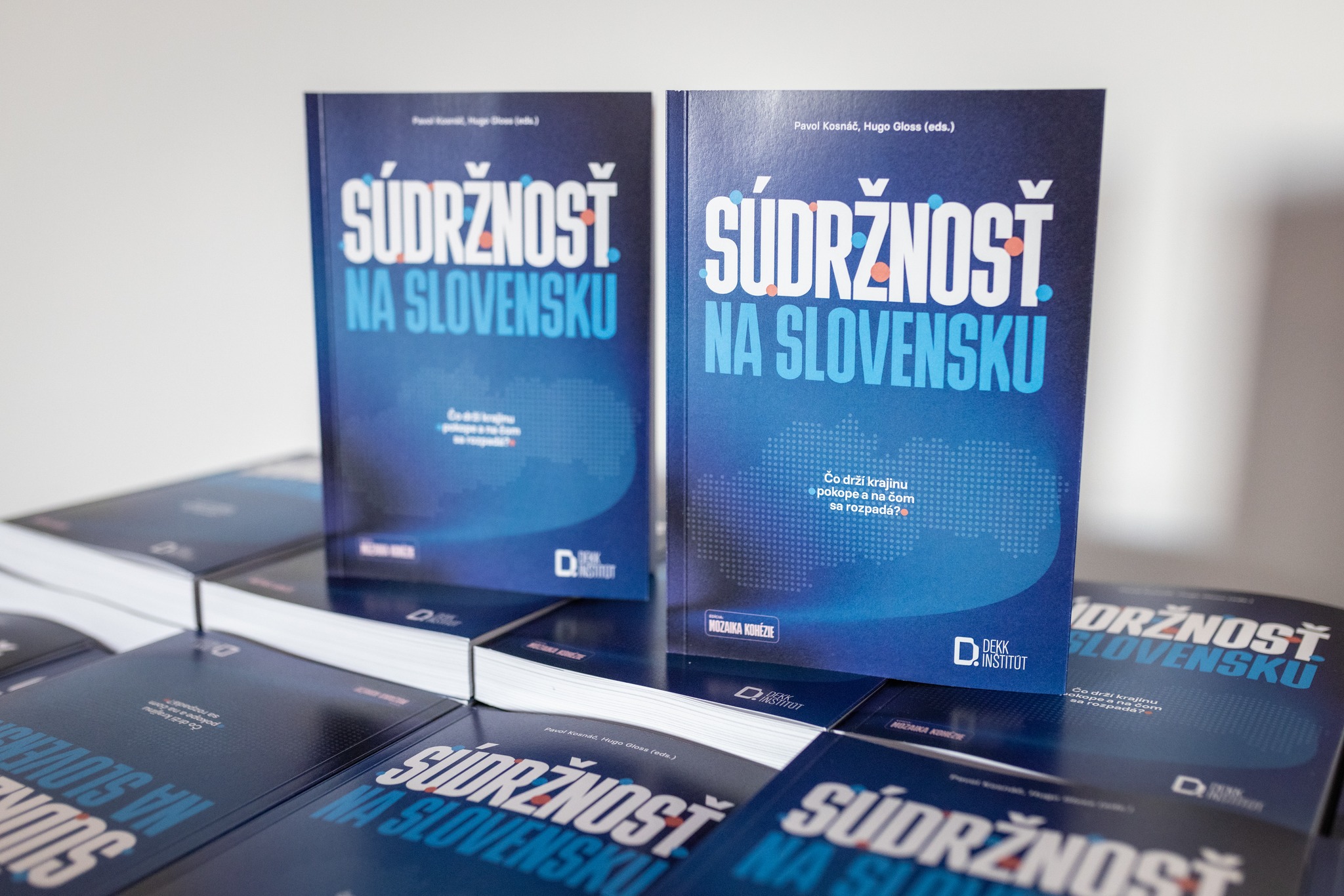
Cieľom knihy Súdržnosť na Slovensku: Čo drží krajinu pokope a na čom sa rozpadá? je otvoriť na Slovensku diskusiu o témach dôvery, patriotizmu a spoločenskej súdržnosti v našej krajine. Kniha chce slúžiť všetkým, ktorí vnímajú tému súdržnosti v našej spoločnosti ako dôležitú: rôznym útvarom štátnej správy, policy-makerom, akadémii, médiám aj širšej občianskej spoločnosti.
Aktuálne sme spustili crowdfundingovú kampaň na prvú knihu z edície Mozaika kohézie. Čo v knihe nájdete?
Dohromady 16 príspevkov od 20 autorov na 367 stranách pútavého textu.
Medzi expertami, ktorí do knihy prispeli, sú 13 vedci zo slovenských univerzít, Slovenskej akadémie vied, Univerzity Karlovej v Prahe, University of Cambridge v UK a University of Agder v Nórsku a 7 takzvaných „experts by experience“, teda odborníkov, ktorí z povahy svojho praktického zamestnania – napríklad integrácia cudzincov, dizajnovanie estónskeho plánu kolektívnej identity, decentralizácia štátu alebo velenie Ozbrojeným silám SR – majú vhľad do problematiky týkajúcej sa spoločenskej kohézie a dôvery.
Vo štvrtok 4. mája sme knihu predstavili verejnosti. Všetky dostupné výtlačky sa v okamihu rozobrali. Akcia bola veľmi príjemná. Bolo radosťou sledovať, ako sa rôzne svety i generácie na mieste konštruktívne prelínajú a spoločne živo diskutujú. Vzťah ku krajine zrejme spája

Trendy (ne)dôvery na Slovensku
Pavol Kosnáč, DEKK Inštitút a Karlova univerzita
Hugo Gloss, DEKK Inštitút a Karlova univerzita
Sociálna kohézia v sociologickej a psychologickej perspektíve
Justin E. Lane, CulturePulse
LeRon Shults, University of Agder
Emócie a spoločenská súdržnosť
Samuel Žilinčík, Masarykova Univerzita, víťaz prestížnej britskej súťaže Royal United Services Institute
Dôvera ako základný pilier sociálnej súdržnosti
Marianna Mrva, Sociologický ústav SAV
Roman Džambazovič, Filozofická fakulta UK
Sociálna kohézia na Slovensku z pohľadu historika
Roman Holec, Historický ústav SAV
Sociálna kohézia a nacionalizmus
Ladislav (László) Vörös, Historický ústav SAV
Spoločenská súdržnosť na Slovensku počas modernizácie a úloha spolkov
Elena Mannová, Historický ústav SAV
Správa o stave kohézie na Slovensku
Marína Zavacká, Historický ústav SAV
Elity a sociálna kohézia na Slovensku
Soňa Szomolányi, Filozofická fakulta UK
Katolíci a sociálna kohézia na Slovensku: Historická (seba)viktimizácia a historická (seba)reflexia
Agáta Šústová Drelová, Historický ústav SAV
Historické korene slovenskej rusofílie, jej dôsledky a možné riešenia
Daniel Šmihula, diplomat a politológ
Cesta k sociálnej súdržnosti: Estónska skúsenosť
Marianna Makarova, Poradkyňa Úradu vlády Estónska pre strategickú komunikáciu
Spravovanie štátu a sociálna súdržnosť
Viktor Nižňanský, Komunálne výskumné a poradenské centrum, n. o.
Integrácia cudzincov a cudziniek po slovensky
Michaela Pobudová, MAREENA, o. z.
Marta Králiková, MAREENA, o. z.
Prierez vývojom dôvery k vláde na Slovensku v rokoch 1990 až 2023
Martin Slosiarik, Agentúra FOCUS
Je Slovensko zraniteľné? Armáda a patriotizmus
gen. Daniel Zmeko, Náčelník Generálneho štábu Ozbrojených síl SR

© 2023 DEKK Inštitút | All rights reserved | CREA:THINK studios
Filip is in charge of working with psychological resources at DEKK.
He has obtained a bachelor's degree in psychology at the Comenius University, while he is also a graduate of the Anton Neuwirth College's two-year program. It was there that he first encountered Aristotle and his idea that everything alive in the world has a natural goal towards which it is moving: prosperity.
So he began to ask the question: if all beings have a purpose deeply rooted in their nature, why do people go against it and engage in destructive behavior? In DEKK, he sees hope for investigating part of this question, that is, why societies fall apart. In addition, he is also interested in the individual dimension of this question: why do the lives of some individuals fall apart? For this reason, he participates in social assistance to homeless people in a low-threshold daily center.
In the past, he organized several discussions with public figures, journalists and statesmen, and also won the Slovakian ŠVOK competition in the Psychology category with his research.
In his free time, he likes to read the newspaper, listen to the Red Hot Chilli Peppers or hang out in the city with a good cup of coffee.
Paulína is studying at the Bratislava International School of Liberal Studies (BISLA) for a bachelor's degree and in the Nexteria Leadership Academy 3-year development program, where she develops her soft skills and organizes community activities.
In the past, she worked on projects for Microsoft, Tatra banka, Slido and the city of Trenčín.
She likes to think about why society is the way it is. Her passion is psychology, informal education and self-development.
Ján Pastorek is one of the founding members of the DEKK Institute.
He graduated from the bachelor's program in computer science at the Comenius University in Bratislava and liberal arts at the Anton Neuwirth College. During his studies, he completed a research internship at the Slovak Academy of Sciences, where he devoted himself to the application of reinforcement learning and genetic algorithms in solving non-local games, i.e. games where connected pairs of qubits are used in order to maximize the winnings of the given game, for which he received the Dean's Prize.
He also joined the Comenius College selection program, where he and other students meet and discuss issues related to science and philosophy. He graduated from St. John's College in the USA, Master of Arts in Liberal Arts, majoring in mathematics, science, philosophy and theology. He is currently finishing the international interdisciplinary Joint Master's program in cognitive science MEi:CogSci at the Comenius University in Bratislava and the University of Vienna, starting his PhD. in neural networks soon.
He is devoted to philosophy, data science, artificial intelligence (especially machine learning) and quantum computing. He works as a data scientist at CulturePulse, Inc., where he mainly develops an agent-based model of information dissemination based on scientific theories.
He likes to ask questions. In order to share this passion, he taught computer science at the St. Uršula high school in Bratislava and led seminars on art as part of the Academy of Great Works program.
Michal Gačko is a graduate of the Faculty of Electrical Engineering and Informatics at the Slovak Technical University in the field of applied informatics. He studied for one semester in Norway at the Norwegian University of Science and Technology as part of the Erasmus program. He also spent some time studying psychology, before definitely opting for information technology. He has experience in the design, implementation and management of various types of database systems, as well as in the design and implementation of architectural patterns and structures in software systems. In addition, it deals with data analysis and data visualization.
Veronika Cigáneková works as an analyst focusing on public policies, translating the DEKK team research into practice.
She graduated from King's College London, BA in philosophy, where at the end of her studies she explored the links between philosophy and public policy. She is currently studying for a master's degree in public policy at Sciences Po in Paris (Institut d'études politiques de Paris).
Her experience is primarily from the non-profit sector, where she founded or led several projects and organizations. Thematically, she was interested in youth civic participation, the development of social entrepreneurship or the topic of Slovak brain drain abroad. Her last experience is from the Nexteria Global HUB project, which she founded and led for two years. She previously worked as a project manager and later as a salesperson at SuperScale.
Her passion is topics related to society and a positive impact on it. This is what she looks for in all the activities in which she is involved.
At DEKK Hugo Gloss is responsible for the preparation and successful implementation of projects. He serves as the Chief Operating Officer (COO) responsible for the smooth running of the organization and its research.
He studied international relations and diplomacy at the University of Bologna and Roma Tre University in Rome and completed a one-year training course at the Anton Neuwirth College. He interned at the Representative Office of the Slovak Republic at the Holy See and at the Department of Communication and Prevention of the Presidium of the Slovak Police Force. He worked at Accenture and coordinated humanitarian projects of Caritas Slovakia in Iraq, Syria, Lebanon and Ukraine. As part of his work, he visited countries where social cohesion has been severely damaged, which is the reason why he cares that Slovakia does not follow a similar path.
He currently works as a researcher at Charles University in Prague and is preparing for his PhD. study, which will be focused on the development of a system for measuring and strengthening social cohesion in Slovakia according to the successful models in other states, with focus on Estonia. He is married, has four children.
Pavol Kosnáč holds the position of scientific director of the institute and leading researcher (PI) of the World Value Survey (WVS) program in Slovakia and the Czech Republic, which is covered by DEKK. He is the author of the program “Slovakia in data”, the goal of which is to accumulate and make available a database of complex social scientific data to the general and professional public.
As part of the DEKK Institute's cooperation with Charles University in the CEDMO project, he leads a team of 9 scientists studying the impact of social changes on the generational shift in values and social cohesion, applied for example in the analysis of the information environment, the growing (un)willingness to defend the country or the impact of war on Ukrainian culture.
He studied comparative religious studies in Bratislava, Islam and philosophy of science at Oxford, and completed scientific internships at the London School of Economics in London and Mahidol University in Bangkok. He is currently completing his PhD. in political science at Masaryk University in Brno.
It deals with the possibilities of interdisciplinary research and the integration of field research methods, psychological and cognitive research tools, public opinion polls and big data. He specializes in the overlap between ideology, religion, violence and war. Experience from humanitarian and research work in Central and Eastern Europe, the Middle East and India led him to try to understand the issues of complex systems, social cohesion and social stability.
He works as a consultant for humanitarian organizations and universities in Great Britain, Ukraine, Iraq and Thailand. He is a registered expert witness in the field of Social Sciences and Humanities in matters of religion at the Ministry of Justice of the Slovak Republic and is a representative of Slovakia with voting rights in the World Value Survey Association (WVSA) and the World Association for Public Opinion Research (WAPOR). He is a member of the Slovak Society for the Study of Religions in Bratislava, the Royal Anthropological Institute (RAI) of Great Britain, a member of the advisory board of the Inform Institute at King's College London and the advisory board of the Forgiveness project at the Woolf Institute at the University of Cambridge.
He has received Peter B. Clarke Memorial Prize in 2013 from British Sociological Association and is co-author and editor of two books studying cohesion and development of belief systems.